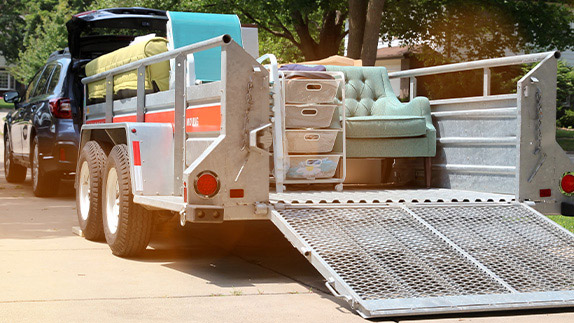How to Distribute Your Trailer’s Weight Safely & Effectively

Balancing your trailer load is essential to safely towing your load on the road. If you’re towing a camping trailer, ATVs, a bunch of logs or a moving van, ensuring the weight is properly distributed and that your trailer can withstand the weight for a long period of time are critical points to check before hitting the road.
The Dangers of an Unbalanced Trailer
Properly securing your cargo should always be the number one priority for trailer owners. If your trailer is unbalanced or holds more than it can carry, it can cause instability and sway and potentially cause dangerous accidents to you or other drivers. Loose cargo can also fall out onto the road, creating hazards for other drivers. Similarly, if your trailer starts to wobble on one side, it may cause damage to your tires, axles and more, making accidents more likely in the future.
Distributing the weight comes down to understanding the weight that your trailer can handle, as well as how to properly place items to distribute them effectively. For example, it would never be recommended to put the heaviest items toward the end or collect them all toward the center.
It’s also essential to use multiple tiedowns when securing your cargo. Whether that means securing your mattress, bikes, or your camper. Before heading out on the road and shortly after you begin, check and recheck the restraints to ensure they work correctly.
Weight Distribution Hitches
When it comes to balancing your trailer’s load, there are two important definitions to understand:
- Weight Carrying Capacity: the total weight a trailer hitch can safely tow without adding a weight distribution system.
- Weight Distribution Capacity: the maximum amount of weight a trailer hitch can safely haul with a weight distribution system.
If you must haul heavy items or are regularly loading up cargo with varying weights, it’s essential to have a weight distribution hitch. These can help increase your weight capacity and prevent dangerous scenarios from playing out. Weight distribution hitches can improve your vehicle’s ability to steer, turn and break, especially with heavier loads.
Additionally, your trailer should never exceed the following:
- Gross Vehicle Weight Rating (GVWR)
- Axle ratings
- Towing capacity
- Hitch ratings
- Receiver ratings
- Hitch ball ratings
Without a weight distribution system, you must abide by the capacity the manufacturer listed as the maximum. However, with a weight distribution system, you can effectively carry and pull more than what’s originally intended.
Properly Loading Your Trailer
Most of the cargo weight should be placed toward the front of the trailer to reduce trailer instability and sway. This ensures it’s positioned ahead of the trailer axles and evenly distributed side-to-side. To determine the tongue weight of the trailer, you’ll need to place the cargo from front to back. The downward weight toward the front will be carried by the hitch ball.
By measuring the tongue weight, you can indicate whether your load weight is distributed correctly. For reference, the tongue weight of your trailer should be between 10-15% of your overall trailer weight. However, this can be slightly higher for 5th wheels and gooseneck trailers, around 20-25%. Keep in mind the 60/40 rule. About 60% of the weight should be placed forward of the axle centerline and 40% behind.
Having too much tongue weight vs. gross trailer weight could cause your trailer to lean forward or “dive.” This will make the front end of your trailer lean toward the ground. This is never ideal, as it puts your entire trailer off balance and could cause you to lose breaking traction and steering control should you have to stop quickly. Similarly, having too much gross trailer weight vs. Tongue weight can put you in the opposite scenario, making your trailer sway and swing back and forth, causing it to easily lose control on the road.
Find Balance with Southside Hitch
If you have questions about how to increase your weight distribution capabilities with your trailer or if you’re in the market for a new weight distribution hitch, reach out to us today. Our team of hitch experts can show you not only how a weight distribution hitch will even out your loads, but we can also help you understand how to load and secure cargo and any other tips to increase your safety and confidence.
Contact us today or reach out at (804) 378-1992.

